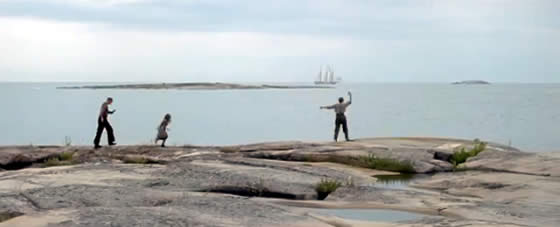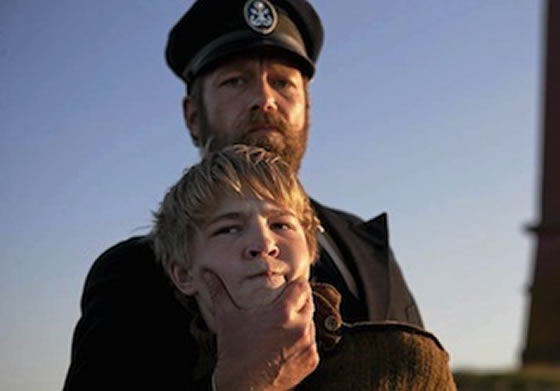 THE DISCIPLE, Finland’s Oscar entry for the Best Foreign Language Film Award, happens An island in the Baltic Sea in the summer of 1939. Thirteen-year-old Karl has come to work as an assistant to Hasselbond, the lighthouse master. Hasselbond at first rejects the boy because of his age, but Karl, who has grown up in an orphanage struggles desperately to stay on, using every opportunity to demonstrate how hard he can work. Finally, Hasselbond accepts him. Karl and Hasselbond’s oppressed son, Gustaf, become friends, but their friendship changes to rivalry and hate when Hasselbond begins to favor Karl over his own son. There are issues in the Hasselbond family that Karl is only beginning to understand.
THE DISCIPLE, Finland’s Oscar entry for the Best Foreign Language Film Award, happens An island in the Baltic Sea in the summer of 1939. Thirteen-year-old Karl has come to work as an assistant to Hasselbond, the lighthouse master. Hasselbond at first rejects the boy because of his age, but Karl, who has grown up in an orphanage struggles desperately to stay on, using every opportunity to demonstrate how hard he can work. Finally, Hasselbond accepts him. Karl and Hasselbond’s oppressed son, Gustaf, become friends, but their friendship changes to rivalry and hate when Hasselbond begins to favor Karl over his own son. There are issues in the Hasselbond family that Karl is only beginning to understand.
Ulrika Bengts, director of THE DISCIPLE (born at 1962) is a Finnish film and theatre director. She is a graduate of the Stockholm Academy of Dramatic Arts and has directed over 20 short films, television series and documentaries. These include Highway Eight (1992), Now you’re Hamlet! (2002), Fling (TV series, 2004) and a first feature, IRIS (2011).
Bijan Tehrani: My first question is how did you come up with the idea of your THE DISCIPLE?
Ulrika Bengts: I was at a film festival in Sweden, together with my producer, and there we met a man from Berlin from Roland Fauser and he came to us and asked if we knew something about lighthouses and lighthouse islands in the Baltic Sea. He said that he wrote a script that took place on a lighthouse island, and that is how it started. We read the script and we were very impressed by it because it was so harsh.
BT: How much research did you do about the era in which the story takes place, because the depiction appears to be very accurate to the time period?
UB: I always do research when I do topics on historical subjects, so I read a lot of books and obtained a lot of photos and I went to a similar lighthouse on the island as well. The movie was shot in the Orand Islands between Finland and Sweden and that is an area I know quite well—I spent my summers in that area for more than 30 years.
BT: I think the location plays a role in THE DISCIPLE, almost like an actor.
UB: Yes, that was the way I saw it also! It was the sixth actor, so-to-speak. 
BT: The story is kind of disturbing to see how these characters have this kind of charisma in away, but it is very hard to always make the audience believe and understand what the characters are going through. How did you go about conveying the emotion in the film; especially with the character of the father?
UB: I think I just made the right choices when looking for the actors. I worked with Niklas Groundstroem before and I knew that he had a certain sensitivity also, and you could see it in him. I was very lucky because we had the opportunity to rehearse with all of the actors for one week. It was just me and the actors and not one person from the crew was allowed. That was really important because it was about putting this old family together. The actors did not know each other from before, so this was important to build the team and the chemistry.
BT: How did you go about casting THE DISCIPLE?
UB: I did the casting myself, so I had auditions and the main job was, of course, to find the right boys. It is not easy to find teenage boys. If we were talking about girls, they are much easier! I think I would have had ten times more girls showing up for the audition than boys, and the youngest who tried for the boy’s part were 11 and looked like children, and eldest were 15. I understand that young buys are changing a lot during this age period, so the youngest boys were quite small and looked like children, while some of the oldest looked like grown men!
Erik Lönngren played Karl in the movie and he comes from the Oland Islands and I worked with him before for my first feature, Iris. He has a lot of experience from acting before. Patrick Kumpulainen who plays Gustaf in the film, he has no experience at all. He just saw an ad about the audition and showed up! So it was really a challenge both for him and for me to perform the role as Gustaf, and I think he does it beautifully; he opened up like a flower during shooting.
BT: Also, the actress who played the young girl was amazing!
UB: Yes, she really was! She was only six years old when we made the movie, but she had experience before. She had made a TV series in Sweden in the same year that we shot the Disciple, so she is quite experienced, even if she is young.
BT: How did you work with your actors? Did you do a lot of rehearsals or were you trying to explain the characters during shooting? UB: We had this week together and I thought that most important thing was that everyone got to know each other so they could get beyond the physical barriers where you don’t dare to touch the other person and so-on. Of course, we talked a lot about the story and re-read the script. There was kind of a dialogue change as well. We didn’t rehearse on the floor because we had no idea where we were going to shoot and we might be in a different phase when it came time to shoot. As you said, the Island itself is one of the main actors in the movie and the Island helped us a lot. I didn’t have so much time with the photographer beforehand so we had no plans for what kind of pictures we were going to take. When the shooting days started, I went through the first scene with just me and the actors, then with the photographer, and then after that the photographer and I talked together and said, “Okay, now we are going to shoot like this!” It was a collaborative process.
UB: We had this week together and I thought that most important thing was that everyone got to know each other so they could get beyond the physical barriers where you don’t dare to touch the other person and so-on. Of course, we talked a lot about the story and re-read the script. There was kind of a dialogue change as well. We didn’t rehearse on the floor because we had no idea where we were going to shoot and we might be in a different phase when it came time to shoot. As you said, the Island itself is one of the main actors in the movie and the Island helped us a lot. I didn’t have so much time with the photographer beforehand so we had no plans for what kind of pictures we were going to take. When the shooting days started, I went through the first scene with just me and the actors, then with the photographer, and then after that the photographer and I talked together and said, “Okay, now we are going to shoot like this!” It was a collaborative process.
BT: What do you think are the chances of THE DISCIPLE getting nominated or winning the award?
UB: I really don’t know, but I am happy of course! We are in L.A. at the moment, but I really don’t know of our chances. I am very proud of my film and, yesterday at the screening and after the screening, I heard a lot of people saying great things about it. I don’t know, but I am hopeful, of course.
BT: A lot of people watching your film have said that it is a dark film, in a way. I found, actually, that the ending opens the way to the future.
UB: That is the way I see it myself. Also, and it is an open ending but it has a certain touch because as the boys are getting away from the Island they are together and they know that things are going to change in the Island with no more Mr. Hasselbond. They have the possibility to go away and to me it is funny to see Gustaf’s reaction when he hears that his father does not want to meet him anymore, and that is something that he is going to take with him for the rest of his life. So for me, this film is about scars—both inside and outside—which we will carry for the rest of our lives.
BT: Do you have any new projects lined up?
UB: Right now, I am writing an original script and we are going to do a TV series in the summer. It is about young girls and adult men, set in a little town in Finland and it is a present day drama.

